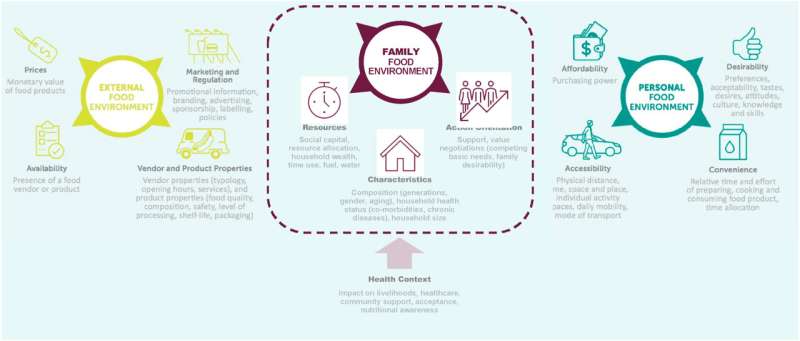This article has been reviewed according to Science X's editorial process and policies. Editors have highlighted the following attributes while ensuring the content's credibility:
fact-checked
trusted source
proofread
Smart food choices at family level can ease chronic illness

Promoting healthy diets for the entire family can better improve health outcomes for people with chronic illnesses, according to a new Cornell study.
"Families are an essential social unit, and food is a social medium: families pool and negotiate food choices, and it's also the way we pass on dietary preferences, traditions and build kinship," said Ramya Ambikapthi, senior research associate in the Food Systems & Global Change program in the Department of Global Development, in the College of Agriculture and Life Sciences.
"If you can change food behaviors at the family level, you have the opportunity to achieve healthier diets for all, now and for the next generation."
Ambikapthi is the co-first author of the paper, published Aug. 7 in Global Food Security and co-written with colleagues from Purdue University, University of South Carolina, Harvard University, Muhimbili University of Health and Allied Sciences in Tanzania, Tanzania Food and Nutrition Center, London School of Hygiene and Tropical Medicine, and the University of Illinois.
Research and policy on nutrition support have historically focused on external factors, such as market prices and availability, and individual factors, including affordability and physical distance from food resources. In the last few years, researchers have begun emphasizing the importance of family food dynamics as both a factor influencing individual food choices and as a policy lever to improve healthy, sustainable diets for all, Ambikapthi said.
In the current study, researchers used HIV as a case study to understand family food dynamics, reviewing almost 7,000 relevant articles. Then they developed a Family Dynamics Food Environment Framework (FDF), which they hope will inform research and policy on an array of chronic illnesses, especially as diet-related illnesses such as diabetes and heart disease grow across the globe.
Because of improvements in disease management, HIV has become a chronic illness that many people can live with for decades; however, such a diagnosis can have devastating economic impacts for individuals and families, especially those already living in poverty in the Global South. HIV-positive individuals may lack energy to perform farm labor or be denied employment because of social stigma.
"If your family supports you, that determines how well you survive, and food is an important part of family support," Ambikapthi said. Food security is particularly important for HIV patients prescribed antiretroviral therapy (ART) drugs, which require a full meal to be absorbed. "When people who have HIV and are food insecure are told to take ART, they don't take it, because if they don't have enough food, ART just makes them throw up."
In low-income households, families also have to cope with the constant pressure of competing basic needs, such as allocating scarce resources to fuel or schooling, or choosing which family members will receive sufficient nutritious food: children, elderly family members, those performing the most manual labor or individuals with HIV.
"Nutrition programs generally focus on pregnant women and small children, due to their critical nutrition needs. But what we want is healthy diets for all," Ambikapthi said. "Understanding how family dynamics impact food choices can help people who implement nutrition policies to structure intervention messages in ways that enable healthy diets for the entire family."
The researchers plan for future work on this topic to explore how family food dynamics can be applied in other contexts; for example, achieving sustainable, healthy diets in urban areas.
More information: Ramya Ambikapathi et al, Expanding the food environment framework to include family dynamics: A systematic synthesis of qualitative evidence using HIV as a case study, Global Food Security (2024). DOI: 10.1016/j.gfs.2024.100788





















